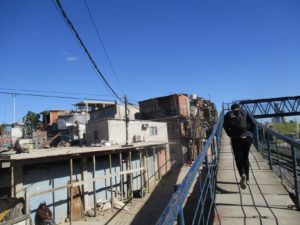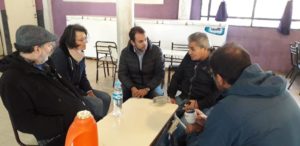by Eduardo Lépore and Séverine Deneulin
In country after country, public health measures of social distancing and isolation have been implemented to contain the contagion of COVID-19. In countries with well developed welfare states, these have been accompanied by social and economic emergency measures, such as furlough schemes and special sick leave. It has already been well documented that the virus may not discriminate, its health, social and economic impacts accentuate deep patterns of inequality.
In countries with existing patterns of high inequality, such as in Latin America, COVID-19 lays bare decades of accumulated disadvantages among a large proportion of its population. Latin America is the most urban and most unequal region, with more than 20 per cent of its population living in informal settlements and 50 per cent of its overall population working in the informalized economy. It is not surprising therefore to observe that COVID-19 is affecting disproportionately those who are already marginalized, due to factors such as co-morbidity, lack of adequate housing, access to water, access to safety nets, and decent employment. The policy responses to the discriminatory consequences of the virus will have long-term consequences for the Latin American city and its residents. The current public health emergency could be an opportunity for bold policies to create more equal societies, but could also be a hazard to exacerbate processes that have led to the current urban segregation. We examine the case of the city of Buenos Aires as an example for other cities which have territorial enclaves of marginalization.
Like in Santiago, Lima, Sao Paulo or Mexico City, when COVID-19 arrived in Buenos Aires, it quickly spread to its informal settlements. As of 25th May, 40 per cent of recorded cases in the federal capital city of Buenos Aires are concentrated in 10 per cent of its population living in shantytowns, where virus transmission could not be easily prevented due to, amongst others, lack of health facilities and domestic infrastructure – piped water, electricity and sanitation, and high levels of overcrowding – it is estimated that more than 75 per cent of households live with more than two people per room.

Public health restrictions on movements have led to a large proportion of households losing their income, thus worsening existing conditions of socio-economic vulnerability. In Greater Buenos Aires, 38.8 per cent of families declared that their income has been reduced up to a half in the month of April, and 18.8% saw their income reduced to more than half. It is estimated that at the start of the pandemic, 25 per cent of households in informal settlements lived in extreme poverty, and 75 per cent in poverty. This figure is even higher for non-income poverty measures. Taking a multidimensional perspective using the Alkire-Foster method and the dimensions of health, housing, education and work, 84 per cent of people in informal settlements were found to live in multidimensional poverty, compared to 11 per cent in the rest of the city. We highlight three public policy implications arising from these data.
First, as economic re-activation occurs in the recovery phase of the pandemic, the design of the lifting of restrictions needs to be tailored to include those who live in informal settlements and who are predominantly employed in the informalized economy. This could take the form of communication through appropriate channels about virus transmission and symptoms. Sector and occupation-specific health guidelines could be developed for street vendors, domestic workers, home delivery workers, waste pickers and taxi drivers. Low-cost hand washing stations or hydroalcoholic solutions could be made available where informal workers operate.
The second policy area relates to social protection floors. The Argentine government has issued a Family Emergency Income of 10,000 pesos (or US$ 154) for unemployed workers, informal economy workers, and self-employed with low income. 8.3 million households are receiving this income. This policy is currently set for one month, to be extended for another month. From a long-term perspective, the UN Economic Commission for Latin America is advocating for these transfers to be continued beyond the pandemic, and to cover a larger sector of the population, especially those at risk of falling into poverty. This could facilitate the move towards the gradual implementation of a universal basic income. No less important is food provision, which is usually done in informal shops within the neighbourhoods, and where electronic payments are non-existent. Communal kitchens play an important role in ensuring adequate nutrition for the most vulnerable residents. This may be the time to channel greater support to these kitchens in order to strengthen their role in reducing poverty.

Authors with Teofilo Tapia, community organizer, Villa 31, barrio Padre Mugica
Third, it is essential to avoid escalation of social conflict and violence. In informal settlements, drug consumption and associated violence is a particular problem, especially amongst young people. Whilst the homicide rate is 3.8 per 100,000 in the City of Buenos Aires, it rises to 28.3 per 100,000 in the informal settlements. 40 per cent of the victims are aged below 25. Providing facilities for institutionally organized recreation and sports activities for young people has been shown effective for addressing these problems. Supporting organizations working with youth could be an essential part of the COVID-19 response in Latin American cities, such as civil society organisations linked to churches given their significant presence in these neighbourhoods.
There is a risk that the effects of COVID-19 and the measures to prevent its spread could exacerbate the existing social isolation and neglect of informal settlements. It could lead to their institutionalised ghettoization. In other words, their socio-economic isolation from the rest of city prior to the pandemic could become a state-sponsored isolation for public health reasons, which could in turn lead to a deterioration of fragile processes of urban inclusion. Poverty and inequality levels could increase significantly, along with an increase in stigmatization, as is already occurring. Now is the critical time to act. The external shock of COVID-19 could be an opportunity to reverse existing processes of urban exclusion and foster the integration of the Latin American city.
Sign up to CDS newsletter for all our latest blog posts and news. Please find the link here.
Responses
